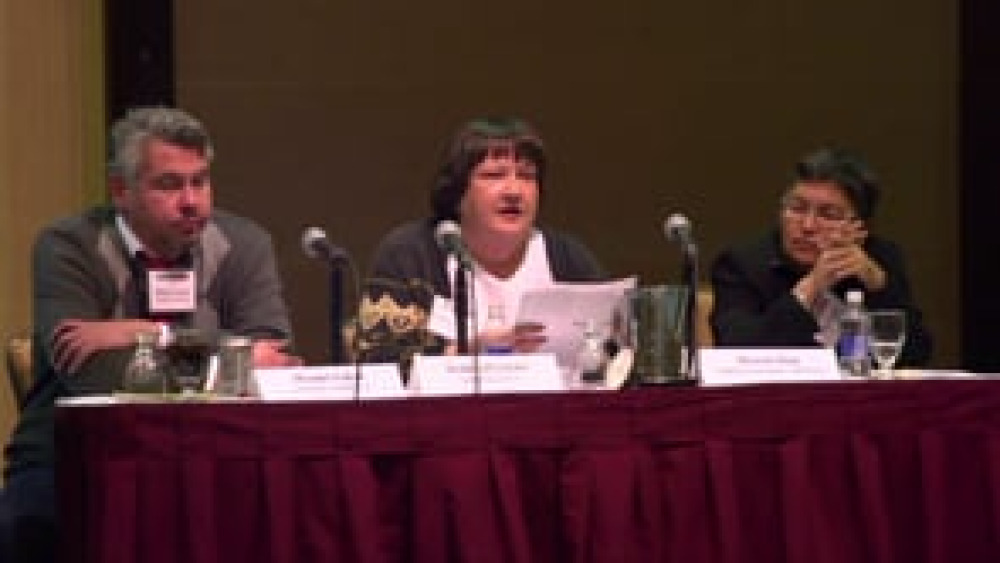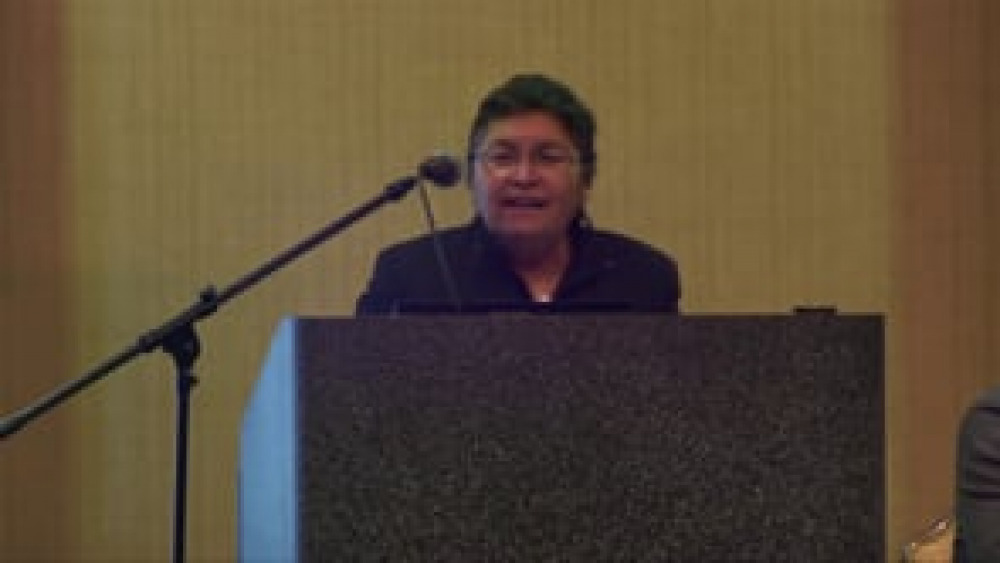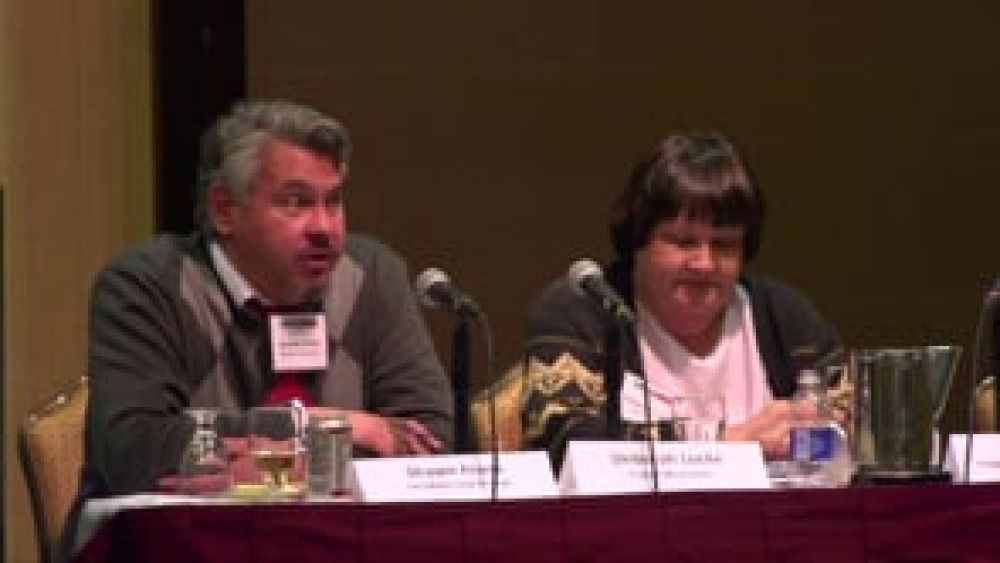Attorney Shawn Frank stresses the importance of Native nations ensuring that they establish and operate processes for disenrolling their citizens that is fair and transparent. He also offers some strategies that a Native nation can follow in order to create that fairness and transparency -- and importantly due process -- for those who the nation seeks to disenroll.
This video resource is featured on the Indigenous Governance Database with the permission of the Bush Foundation.
Additional Information
Frank, Shawn. "Disenrollment: Considerations of Process." Tribal Citizenship Conference, Indian Law Program, William Mitchell College of Law, in conjunction with the Bush Foundation. St. Paul, Minnesota. November 13, 2013. Presentation.
Transcript
"I'm Shawn Frank. I'm an attorney here in town and I've worked with a number of tribes on a variety of membership issues, one of them being disenrollment. And so I'm just kind of here to provide a legal perspective and kind of to talk a little bit about my experience in the area, but also to kind of talk about the process of disenrollment and if a tribe were to go down that road, kind of some of the things that I think are important for a tribe to consider in pursuing disenrollment.
As probably a lot of people have seen in the news recently and going back a good 10 years, the trend of disenrollments in tribes is on the increase. The first...one of the first big disenrollment efforts was in California with the Pechanga Band and there are tribes in California, Nevada, just recently Washington...at the Nooksack Tribe, began a series of disenrollments, Michigan, and those are ones that have had some prominence because of the number, but I think a lot of tribes have at various points undertaken some of these actions. When you start looking at some of the numbers and some of the statistics on there, some of the tribes in California have disenrolled almost about half of the membership and then the question arises is, what is driving the tribes to do this? And you usually hear one of two answers.
One is the tribe's perspective, that as a sovereign it has a responsibility to maintain a proper tribal roll and it has the authority to determine membership and it needs to enforce those requirements. On the member side, a lot of times it's seen as longstanding family animus or some sort of witch hunt against a family group or opposition or that if there are fewer members, especially if it's a profitable tribe, if there are fewer members, then everyone else's distributions go up and the membership numbers go down. And all of that aside, the Supreme Court has held fast that tribes determine their own membership and in determining that membership also comes the authority to revoke membership, to...you can grant membership, deny it, revoke it or put conditions on it.
So kind of from the legal perspective, the issue of can tribes disenroll is generally an emphatic, 'Yes, tribes can.' And so there's not a huge, I think, legal analysis that goes in there. Of course, every tribe has its own specific constitution and its own rules. There are tribes that...there was a tribe I think in California that before it even began its development of a casino project, it amended the constitution to prohibit the disenrollment of members so they had actually put in a safeguard even before it got to the stage where this issue could have arisen. There are a few other tribes that have some provisions or a tribe's ability to disenroll either by the constitution or the court's interpretation of the tribe's constitution limits it to cases of fraud or mistake. So there are certain limits that tribes do have, but it's limits that they have placed on themselves.
So what I'd like to kind of talk about is the process that I have seen that has worked I guess for some tribes and one of the things I was struck in Deb's [Deborah Locke's] presentation was when she was talking about the process that was due and I think that's such a fundamental issue. And I guess before I get into that, as an attorney representing tribes, the tribes are my client and it's a decision that the tribe makes to pursue these proceedings and it's a hot-button issue and there are a lot of strong feelings about it. So when I'm talking about having a fair process, it's not necessarily saying that a tribe's decision to do...to go down that road or not is something I would support, but representing the tribe, if they've asked me to help them enforce their constitution or to follow through on an action that they believe is lawful then I have an obligation to that client. So from my perspective it's kind of this...sometimes it's an uneasy practice, so when I talk about what things have worked for tribes, I mean what things tribes can do to provide members with enough opportunity to be part of the process before decisions are made.
So one of the things that I think tribes have grappled with is what is actually in their constitution, not only in terms of what is the membership criteria, but also who has the power or does the tribe even have the power to disenroll? I've seen arguments that have said the constitution doesn't include that so the council doesn't have that authority. And if it's a tribe where a lot of the power rests with either membership -- or sometimes it's called the general council -- or that...and it hasn't been delegated specifically to the council or the business committee, does the power of disenrolling or of disenrollment actually lie with the general membership? I haven't seen an instance where it lies with the general membership, but I'm not sure that that issue has been raised in some of these areas and generally it is the [tribal] council who has taken on the decision and the process to begin looking into these sorts of things.
One of the things that I think is really important is -- and some of this is my personal view -- is people have secured membership with the tribe and that has certain rights that come along with it and I think one of those rights is to be secure in that membership. And one of the things that I have seen on occasion is where members are not allowed the opportunity to have the evidence brought to them that what is the tribe's case, why is the tribe doing this, what documents does the tribe have? And sometimes there's an attempt to subvert whose burden it is to prove this. And one of the things, I think, if a tribe is going to establish a process is that the tribe needs to take the responsibility to A, make sure that it has its supporting documents.
There's been...I think there was...was it the Graton Rancheria in California, where literally one day people got a letter in the mail that said, 'You've been disenrolled.' So there was no...there was no warning, there was no opportunity. So what I've seen some tribes do is -- whether it's the council, an enrollment department, a separate board or panel -- will gather kind of the evidence and make a determination whether or not to begin a disenrollment proceeding. And so even at that really preliminary stage, they've shared that information with the member and given the member an opportunity to submit information that they have to kind of help clear that before they even begin the process. And sometimes some of these things are resolved at that stage, but occasionally the tribe will move forward and actually begin, in some instances, begin a disenrollment proceeding. Like I noted, sometimes the tribe just sit down and they just vote and say, 'You've been disenrolled.' So I think in terms of providing a process for the members to submit their evidence to really fight for their membership...because a lot of times the tribe's information could be wrong or it's incomplete, and so sometimes I think having that initial dialogue before the process or a proceeding begins is really helpful.
One thing I've also seen in some of these proceedings is if there is a hearing, I've seen instances where members are not allowed to have...be represented by counsel, where there were no outside people allowed in the proceeding, there was no recording of the proceeding, they weren't allowed to see the tribe's evidence, they weren't allowed to submit anything additional at the hearing. So there were a number of things, and I don't think you need to be a lawyer to realize that there's a big problem with having due process and meeting those sorts of requirements. So I think if a tribe has a process where it is going to conduct disenrollment proceedings that it should provide as many safeguards to the member as possible. I'm also aware of a tribe that -- in addition to being able to have a hearing where you get to submit evidence -- you get to call witnesses, you can ask the tribe for its evidence so you have some discovery rights, you can be represented -- I forgot where that was going -- but to have built in enough safeguards to allow the person to present their case so that it's not done in a vacuum and it creates a little more openness and transparency to the proceeding. And I think when you read a lot of media accounts of some of these things, that is usually the thrust of the article is that it's based on greed, they just want people off and nobody got a fair shake. The first two things I don't think lawyers or the tribes can deal with, but at least providing notice of a hearing and adequate safeguards at least prevents that perception from continuing that the tribe has not operated in an open manner.
And I think kind of one of the things when I was talking with Colette [Routel] about coming and doing this was from a legal perspective that's one issue, but then when you talk about the moral imperative that tribes have from a cultural component, it's kind of hard to, I think, kind of sit up here from a legal perspective and just kind of try to put disenrollment in a vacuum because there is such a human element. And one thing I also think that is critical is the more independent the fact finder can be, that it isn't the tribal council, that it's not the enrollment director, that it may be a panel of elders, it could be an independent person. I know one tribe that actually has an administrative process where they have law trained judges who evaluate the evidence based on the tribe's constitution and the membership criteria and they're the ones who make the decision, it ultimately goes back to the tribe but that has set in part an administrative record so when the court reviews it, there's actually a lot more information and a lot more process and I think that has allowed the tribe to document that to show that this isn't happening in a vacuum, this isn't a secret star chamber. These proceedings are open and although they may be...people may question why the tribe is doing them, at least the tribe has taken the steps it needs to kind of protect itself.
Kind of moving through the process, I guess one of the ultimate things is ultimately who is the decision maker and one of the things I've heard people talk about is, 'Well, if the council makes the decision, what recourse do I have?' And sometimes there is nowhere else to go, if the council has made its decision then that's the last step. And a lot of people have talked about, 'Well, there should be some sort of court review after that where the court actually will end up making the determination.' And one of the things I've always been struck by that is if the council is charged with ensuring a proper membership, but it's ultimately the judge or the judiciary who's making that decision, does that somehow run afoul of where the authorities in the constitution lie? And so sometimes I think the tribes' constitutions actually set up a process where there probably can't be judicial review because then ultimately the constitutional authority is being exercised by somebody that it wasn't intended to be and I've seen that a lot of times ultimately too in, especially in gaming regulation where you have licensing decisions being made by gaming commissions who are charged with regulating, but then they're challenged to the court and it's ultimately the court who's making the determination of license and eligibility, but they're not the regulator. So it kind of creates this strange dichotomy of, you want more review and you want process, but sometimes that's not possible.
And I think just in closing it's such a divisive issue and each tribe is unique and its history is unique and devising a process to review membership decisions...I think each tribe has the ability to craft whatever they would like, but at a minimum, I think that there'd need to be certain safeguards for the members and it's not a one-size-fits-all approach. So I look forward to questions here when we have the time. I'm sure there will be a few and I would like to turn it over to Sharon [Day]."



